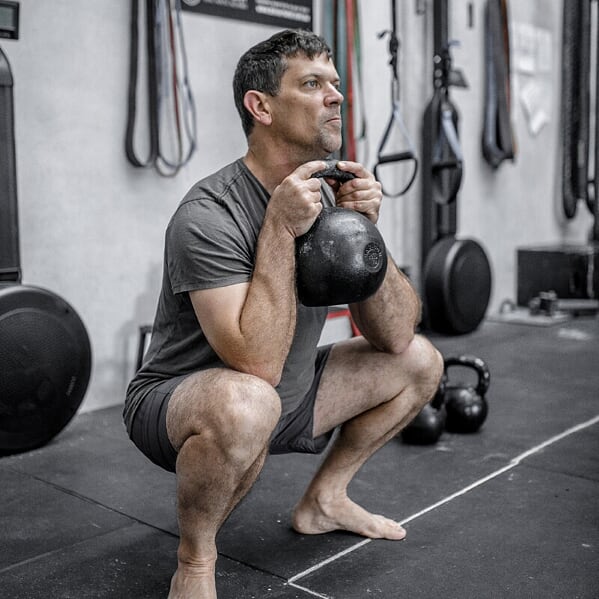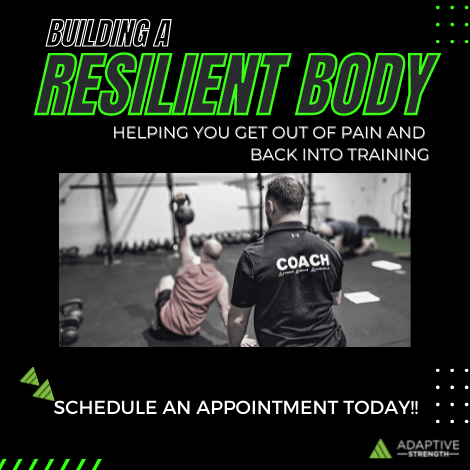There is so much conflicting and confusing information out there when it comes to health. This makes it so hard to recognize what information to believe and apply to your own life in the hopes of improving health and longevity. This is a guide to help you get clear on where or what you should be prioritizing in your own life.
While there are many definitions for what “Health” means our favourite is definition is “the ability to adapt and self-manage in the face of social, physical and emotional challenges”. This is such a powerful definition with the emphasis on self-management which is why we have adopted it here at Adaptive Strength. We strongly believe that the best person to be responsible for your health and longevity is you and self-management is key. This guide aims to give power to you!

With this in mind, our priorities for health and longevity are as follows:
- Engage in regular physical activity that meets/exceeds current guidelines
- Maintain a healthy bodyweight and body composition
- Get sufficient durations of high-quality sleep
- Avoid smoking and the use/abuse of other addictive substances
- Seek medical care for a limited set of routinely monitored check’s
- Learn about and apply self-management strategies for pain
- Develop and maintain meaningful social connections with others
Below we have touched and given a brief overview on each key point to give you a good starting point. This is not meant as the ultimate resource but rather a good starting guide.
Engage in regular physical activity
Physical inactivity is a major health problem worldwide and is the fourth greatest global risk factor for death according to the world health organisation behind high blood pressure, tobacco use and elevated blood sugar. Unfortunately, in Australia according to the Australian Institute of Health and Welfare (AIHW) in 2018 only 23% of adults met the physical activity guidelines. Shockingly only 12% of children and 2% of adolescents met the physical activity and screen-based behaviour guidelines.
Current Physical Activity guidelines for all individuals should meet and/or exceed the following:
- 150 to 300 minutes per week of moderate-intensity aerobic work
Or;
- 75 to 150mins per week of vigorous-intensity aerobic physical activity and;
- Resistance training of moderate intensity involving all major muscle groups on 2 or more days per week
Individuals meeting both the aerobic and strength training components of these guidelines have better health outcomes across a range of conditions, including obesity, high blood pressure, diabetes and a number of other conditions as well.
Maintain a healthy bodyweight and composition:
Overweight and obesity are characterized by excess body fat that can negatively affect health. Worldwide, obesity has nearly tripled since 1975 and in Australia, it is estimated that by 2030, nearly 1 in 2 adults will have obesity. While many carry excess body fat many individuals carry too little muscle mass as well. Nutrition changes can have a powerful effect on both these conditions.
Excess bodyfat is ultimately the result of an imbalance between energy intake and energy expenditure. While many different “camps” blame a single thing such as carbohydrates, animals foods, hormones, sugar, or others, there is never one isolated cause of obesity. It is always a complex process influenced by the interaction of a variety of biological, psychological, and social/environmental factors that need to be addressed.
We recommend a measurement of waist circumference as a quick and easy way to determine if you may be carrying excess body fat.
| Male Waist Circumference | Female Waist Circumference | Health Risk |
| Less than 94cm | Less than 80cm | No increased Health Risk |
| 94-101cm | 81-88cm | Increased Health Risk |
| Greater then 102cm | Greater than 88cm | Significantly increased health risk |
If you find that you have obesity or are at risk for it, the next steps involve changing eating behaviours and dietary patterns. If you want more resources on this please reach as out, we can help guide you towards who or what might be the easiest and most effective path for you to take. These changes can be difficult for many individuals due to the variety of biological, psychological and social/environmental factors at play.
Get Sufficient durations of high-quality sleep:
Sleep is just so important for a variety of reasons; it has benefits in mental health and cognitive function, recovery from and adaptation to exercise, cardiometabolic health and many others. Unfortunately, many people get insufficient or poor-quality sleep and is often the first area we ask about when an individual reports symptom of fatigue.
We recommend the following good sleep habits (known as “sleep hygiene’):
- Maintain a consistent bedtime and awakening time
- Avoid alcohol and caffeine for 4-6 hours before bedtime
- Maintain a cool temperature and adequate ventilation in the bedroom
- Block out distracting light
- Reserve the bed for sleep only. Do not use the bed for work, watching TV or using other electronics
- Establish a pre-sleep ritual and use relaxation techniques before going to bed if necessary
People with more severe cases will benefit from seeing an appropriate specialist. Feel free to reach out and we can direct you towards the right professional for you.
Avoid Smoking and the use or abuse of other addictive substances:
Tobacco use has been disastrous for human health. Smoking is one of the leading causes of preventable disease in the Australia and accounts for 1 in 5 deaths every year. While it has been in decline in Australia about 14% of adults still currently smoke so there is still plenty of work to do.
Close behind, alcohol has negative effects on almost every major system in the body, as well as negative effects on others due to injuries and violence. Alcohol alone is responsible for nearly 6000 deaths annually in Australia. If you currently smoke or drink heavily you are exposing yourself to harm that cannot be overcome through diet, exercise or other medical interventions. Cessation or reduction of use with these substances can be very difficult but reach out and we can direct you towards available resources and professionals to help get you started.
Routine, Appropriate medical care:
In terms of health screenings, the most important we recommend on a broad scale the following to be regularly screened:
- Blood pressure
- Blood lipids/Cholesterol
- Depression
Learn about pain self-management:
Pain is a normal human experience that is a part of life. However, it can be extremely distressing and disabling, particularly when it persists without a clear reason. Learning how to self-mange your own aches and pains is an invaluable skill that can help to reduce unnecessary fear, disability and the harms of over-medicalization.
Develop and maintain meaningful social connections with others:
Humans are social creatures and benefit greatly from healthy interactions with others. Positive support from family and friends is important when attempting to change behaviours. Similarly, lack of support can jeopardise those efforts and is implicated in increased risk for substance abuse and depression.
Depression puts you at risks for multiple adverse health outcomes. If you suspect that you are depressed, or are suffering from undue emotional distress, seeking professional treatment is highly recommended and we only serve to better your health and performance.
We hope that this overview was helpful in guiding your priorities in the pursuit of health. Which areas of your life do you feel need work? Pick the easiest and most achievable and start there. As mentioned earlier this guide was meant as a starting point to get you thinking about where to prioritize your focus for improved health and longevity. Best of luck on your journey and reach out if you ever have any questions we are here to help.







